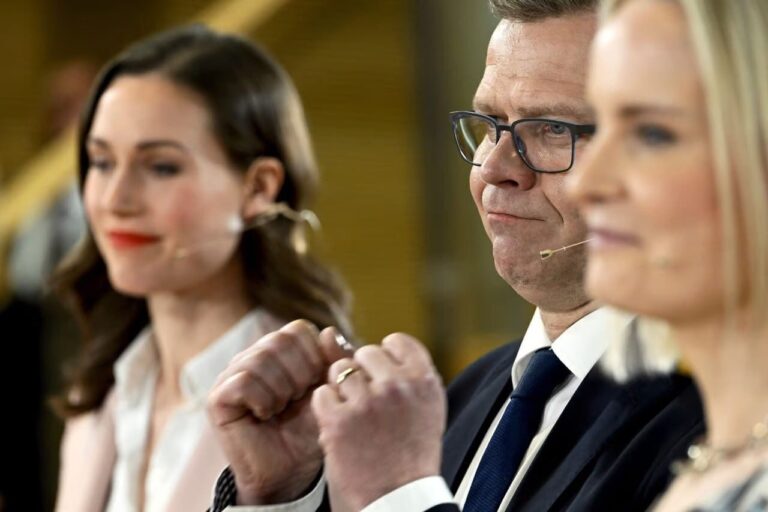Finland turns to the right. Sanna Marin emerges defeated in legislative elections. The outgoing social-democratic premier failed to win a second term.
Winning was the center-right coalition led by Petteri Orpo with the National Coalition Party (Ncp) in the lead followed in second place by the far-right “True Finns,” led by leader Riikka Purra.
Only third was Sanna Marin’s party with 19.9 percent.
Now it will have to be seen whether Orpo, will be able to gain a majority. With 20.8 percent of the vote, he will be able to count on 48 seats in parliament. The conservative candidate is trailed by the ultra-right, which reached 20.1 percent and obtained 46 seats. Only third, precisely, are the Social Democrats, who with 19.9 percent do not go beyond 43 seats.
Table of Contents
Finland elections, a difficult compromise
Thus, a tortuous negotiation lies ahead for the formation of the coalition that will support the government, considering the various cross vetoes expressed by some forces in the election campaign.
A majority requires 101 MPs out of the 200 in parliament. Both Marin’s Social Democrats and Orpo’s center-right are up sharply from 2019. In a vote that has divided the country between those for and against welfare cuts or austerity measures to reduce debt, amid skyrocketing inflation and fears of recession.
On this polarization, all parties in the coalition supporting the young premier lost votes. With a debacle by the Greens and an above-expected hold only by the Center (12.5 percent). Which will be decisive in the formation of a coalition in which even one MP makes a difference. In 2019, the Spd won the leadership by just one seat over Purra.
Austerity and euroscepticism wins over Marin’s leftist line
The vote in Finland comes just days after the last missing green light for historic NATO accession, with ratification in Turkey arriving Thursday. But the issue is so widely shared that it has been left out of the debate.
The 37-year-old Marin, who is well known abroad and hugely popular at home, in part due to her exemplary handling of the pandemic, has moved the Social Democrats to the left in the campaign. Thus focusing on welfare and especially education.
Which, she believes, can boost the country’s wealth. While attributing the rise in public debt only to the pandemic and crisis in Ukraine and saying she opposes any spending cuts.
Instead, the Orpo Coalition calls for 6 billion euros in austerity measures to bring public debt back to virtuous EU values.
The True Finns, on the other hand, express openly anti-migrant and eurosceptic positions. Starting with the call for not meeting the commitment to climate neutrality in 2035. And, without reneging on the old goal in the long term of ‘Fixit,’ Finland’s exit from the European Union.
Sanna Marin defeat, the European balance changes
While the war in Ukraine goes through a period of relative stagnation awaiting reciprocal counter-offensives, on the economic front the effects of the neoliberal economic policy followed by the European Union are beginning to occur.
The real cause of this election outcome is the impressive growth that has occurred in Finland in inflation. Which has risen to a worrying 8.8 percent.
Thus, the consequent spread among voters of the belief that all this is due to the lack of a common policy of the European Union.
As well as the fact that the latter protects the situation of economically stronger countries and harms economically weaker countries. Thus even admitting the existence of tax havens, declared legitimate by the European Court of Justice itself.
What is worrying is that the collective imagination and the convictions of the ruling political class lack the idea that the European Union does not ensure the economic and social equality of the member countries.
This, since it grants the ultimate decision-making power to the Council of Ministers of the various countries. In which the strongest ones, such as Germany, the Netherlands and France, have the upper hand to the detriment of the weakest.
Read also: Shrinkflation skyrockets: how one European country tries to curb the phenomenon












